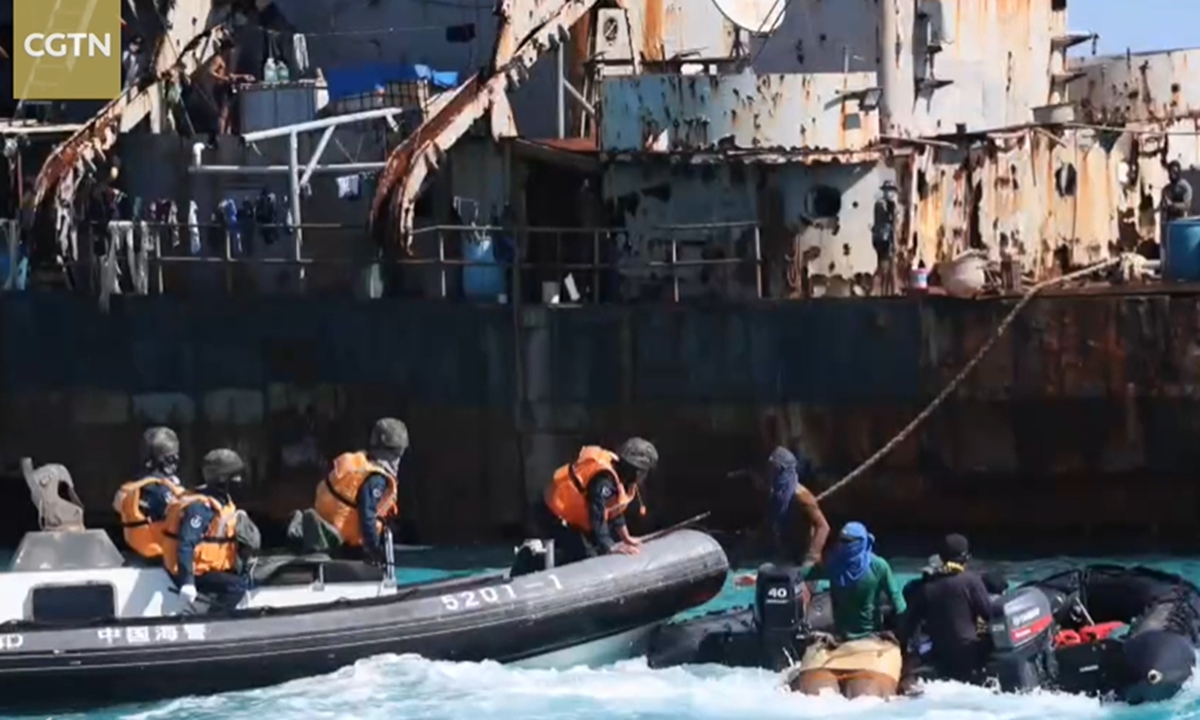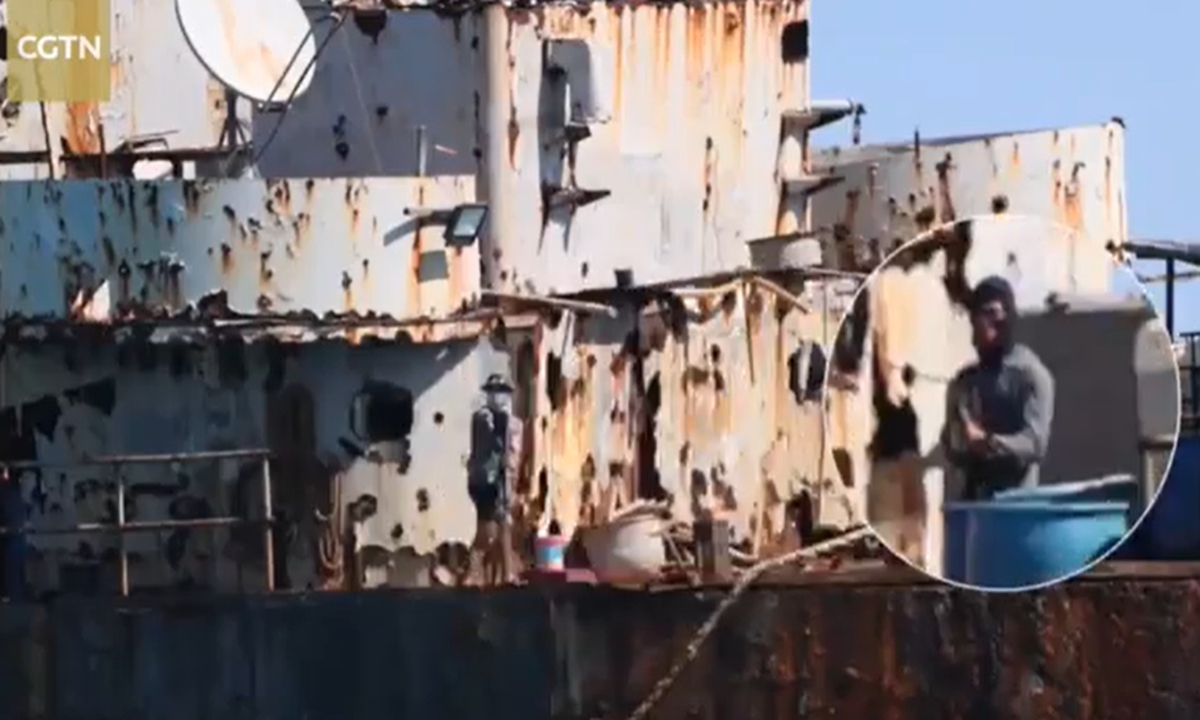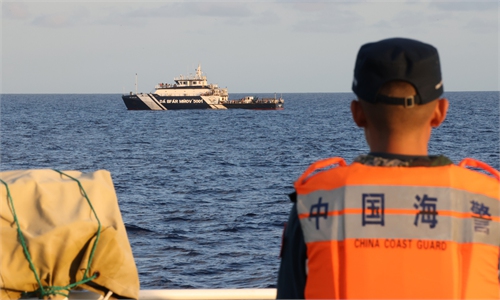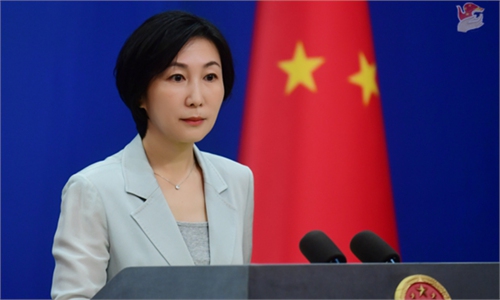Philippine provocation in South China Sea: A significant move with wartime implications

A screenshot from the footage released by CGTN
In recent days, the Philippine military's airdrops at Ren'ai Jiao on May 19 hit the headlines again, as a Philippine military official claimed that China "confiscated their supplies." However, looking back at how the Philippines made an air-drop supply sortie to its illegally grounded military warship at Ren'ai Jiao on that day, there are several noteworthy questions and concerns that need to be addressed.
First, personnel on a Philippine ship pointing guns at China's Coast Guard (CCG) was the focal point of the incident. Regardless of any post-event explanations provided by Philippine military leadership, this provocative behavior captured in on-site videos cannot be justified.
In contrast, the CCG has consistently demonstrated a high level of professionalism and restraint in law enforcement operations. During their law enforcement activities, they have been keeping their artillery covered and abstained from carrying firearms, adhering strictly to a non-military and non-belligerent posture. This represents a standard crisis management procedure aimed at signaling the de-escalation of conflicts and underscores a crucial gesture of goodwill, with the aim of avoiding uncontrollable escalation of on-site situations.
The Philippine action of aiming guns at the CCG during this incident is a significant move with clear wartime implications. It indicates that the Philippines has either permitted or explicitly instructed on-site personnel to conduct tactical operations in a militarized conflict and confrontation setting. Put plainly, it suggests that the Philippine side is engaging in wartime behavior.
From a reciprocal standpoint, to defend itself, China also has the right to take armed measures. Hence, it is crucial to remind the Philippines to take heed: China has consistently exercised considerable restraint in border and maritime dispute zones, emphasizing the importance of both parties refraining from using live ammunition and avoiding armed provocations that could escalate into war. This has all been well-recognized by the international community. Furthermore, the Philippine military should be cautioned to learn from historical lessons: China has ample experience in similar situations, where it has been compelled to swiftly resort to armed retaliation, achieving decisive victories on a broad scale.

A screenshot from the footage released by CGTN
It would not be a wise move for the Philippines to repudiate its own commitment to tow away the grounded vessel and tear up the agreement on the "new model" under the current administration. In such a scenario, if the Philippines initiates provocation first and China responds in self-defense, leading to a military confrontation or even armed conflict, then Manila must bear full responsibility for any unforeseen and uncontrollable consequences in Ren'ai Jiao and its nearby waters and reefs.
Second, the Philippines' disclosure of videos illustrates its bullying and unprofessional, risky, provocative behavior. In the videos released by the Philippines showing the two countries' vessels engaged in searching resupply operations.
A video clearly confirms that the two Philippine vessels repeatedly interfered with the Chinese vessels, posing a serious threat to the safety of the law enforcement personnel on board. At the same time, the two Philippine vessels repeatedly crossed the path of the Chinese vessels, implementing tactics such as encirclement. The Chinese vessels made multiple evasive maneuvers, showing great restraint, but still came close to colliding several times.
The two-minute video shot by the Philippine side is extremely distressing, causing constant worry for the Chinese law enforcement personnel on the two small vessels, and admiration for their restraint, professionalism and dedication to their mission.
The actions of the CCG conducting law enforcement operations in Chinese waters are fully in accordance with international and domestic laws. Inspecting the airdropped supplies from the Philippines is a normal part of the Chinese law enforcement officers' maritime law enforcement duties, as well as a necessary measure to uphold the status quo of Ren'ai Jiao as an uninhabited island reef, in compliance with the Declaration on the Conduct of Parties in the South China Sea. The personal safety of Chinese law enforcement personnel must be respected and strictly protected.
The Philippine military, coast guard and personnel on site must be warned that any provocation against the personal safety of the Chinese law enforcement personnel is a clear violation of Chinese sovereignty. Any casualties among Chinese personnel will provide full legitimacy for China's reasonable counterattacks.
Third, the Philippine military accuses CCG vessels of fishing for airdropped supplies, while propagating successful resupply domestically, a typical case of dual false propaganda. To cover up their provocative actions of illegal resupply, the Philippines continues to create new lies to confuse the public. These include, but are not limited to, claims that the Chinese wasted food by scattering resupply materials, and that injured soldiers were unable to be evacuated due to Chinese obstruction.
It must be clear that the root cause of all these claims is the Philippines's failure to fulfill their commitment, engaging in illegal resupply operations and resorting to armed conflict provocations such as brandishing firearms and ramming vessels on site. If the actions of brandishing guns, ramming vessels and spreading rumors at Ren'ai Jiao are linked to the recent disturbances at Xianbin Jiao and Huangyan Dao, the entire picture is enough to alert the international community: the Philippines is not safeguarding so-called security. They are engaging in a narrative of deception to disguise a series of overall expansionist actions. All these actions seem like a group of fanatical war profiteers are releasing smoke bombs to deceive the international community and manipulate domestic populations for their aggressive ambitions. Such behavior, regardless of its guise, will be reviled by the entirety of human history.
The author is deputy director of the Institute of Maritime Strategy Studies of China Institute of Contemporary International Relations. opinion@globaltimes.com.cn



